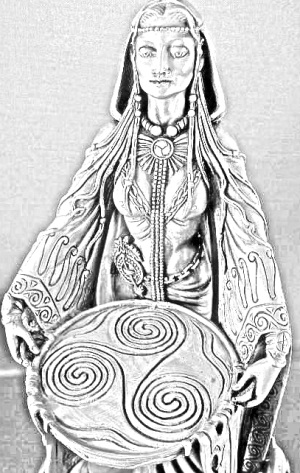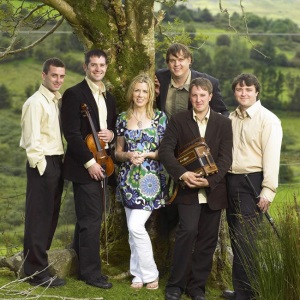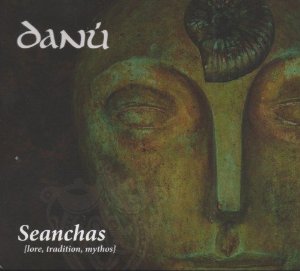Danu – The Myth, The Goddess, The Band

Celtic scholars agree that Danu is the name of a deity that ranked high in the Celtic Pantheon dating from the earliest history of the Celtic peoples. The consensus seems to be that Danu was most likely the Celtic Mother Goddess and that she gave her name to the Tuatha Dé Danann (Children of Danu). But beyond this point the Celtic scholars diverge on the identity and origins of Danu. A mystical figure shrouded behind the curtain of lost knowledge that died with the last Druid.
There is general agreement that Danu is related and cognizant with the Irish deity Anu, referred to as the mother of the gods of Ireland, and the Welsh deity Don, a mother fertility goddess. The similarity in spelling and the fact that Anu and Don are female deities related to the fertility of the land allows for the argument that Anu and Don are strongly connected to Danu and may be the same goddess in Irish and Welsh form and thus merging Goidelic and Brythonic.
Patricia Monaghan in the Encyclopedia of Celtic Mythology and Folklore has the following entry on Danu:
Most significantly, we find an Irish divine race, thought to represent the gods of the Celts, called the Tuatha Dé Danann, the people of the goddess Danu”. Similarly we have this entry from the Dictionary of Celtic Mythology by Peter Beresford Ellis: “A mother goddess from whom the Tuatha Dé Danann take their name. If her (Danu) counterparts in the Welsh tradition are anything to go by, Danu’s husband was Bile, god of death. The Dagda is her son.
Regardless of Danu’s origins, this deity lives on in the popular imagination of the modern Celtic nations. A survey of the internet discloses a technology firm in Ireland named Danu, the popular Celtic band Danu and many pubs named after the Celtic Mother Goddess. There are countless references to this Celtic deity in what might be called the genre of new age mysticism. Thus in spite of the scholarly speculation which hesitates as to her identity and origins, Danu has seeped into modern Celtic consciousness.
Danu the Band
We are very proud of our culture and heritage and also really enjoy performing some pieces from other Celtic regions especially some tunes from Scotland and Brittany. We can really feel the Celtic link between the regions even though the music and language are individual to each.
- Danu’s Benny McCarthy
The founding members of Danú (Gough, Clancy, Bracken & McCarthy) met in Waterford in Ireland in 1994, and consolidated as a band after performing in Brittany’s Festival Interceltique de Lorientin 1995. Their second album, Think Before You Think (2000) was voted Best Overall Traditional Act by Dublin's magazine Irish Music. They are the only band to have been voted Best Traditional Group twice in the BBC Radio 2 Folk Awards, in 2001 and again in 2004 when their version of Tommy Sands's "County Down" also won Best Original Song.

Benny McCarthy manages and performs with the band and plays Button Accordion/Melodeon. Benny won the All Ireland Oireachtas in 1994 on both Button Accordion and Melodeon. He is the driving force of Danú and is a key member of several other bands.
Muireann Nic Amhlaoibh is the lead singer, and plays flute and whistle with the band. She sings in English and Irish, in the folk and Sean Nós traditions. She replaced earlier singer Ciarán Ó Gealbháin, a tenor who left to finish his education, and who had in turn replaced Cárthach Mac Craith, who sang in the earliest incarnation of the band.
Tom Doorley is the flute-player, and often acts as the spokesman for the band on stage. He is a story-teller and works as a teacher and lives in Dublin. Dónal Clancy is the guitar player for the band. He was one of the original members, and after several years pursuing a career with Solas and touring with his father, balladeer Liam Clancy (of Clancy Brothers and Tommy Makem), Dónal returned to Danú. During his absence he was replaced by guitar player Noel Ryan.
Oisín McAuley plays four and five string fiddle with Danú. He recently released a solo album of fiddle music. Earlier fiddle players for Danú are Jesse Smith and Daire Bracken. Éamon Doorley plays bouzouki and fiddle, and is the younger brother of Tom Doorley. His bouzouki playing has a strong emphasis on countermelody. He currently collaborates with his wife Julie Fowlis, playing mainly Scottish Gaelic music and song.
Donnchadh Gough plays both bodhran and uillean pipes in Danú. Clancy, Gough, and McCarthy were founding members of the group. The Doorley brothers joined in 1996.
Interview with Benny McCarthy of Danu
Transceltic are pleased to interview Benny McCarthy, a founding member of Danu:
1. The band takes their name from the Celtic mother goddess Danu. Can you tell us how the band came to adopt this name?
We were actually given this name in 1995 by a good friend Trisha Hutton. We needed an Irish or Celtic name for the band to be part of the Lorient Inter-Celtic Festival in Brittany the same year; this is one of the biggest gatherings of Celtic Nations in the world. The name has been very good for the band and brought us a lot of good luck over the years.

2. Do the band consider themselves to be ambassadors of Celtic culture? Can you tell us about the background of the band’s current members?
Yes of course, we play ancient traditional music of Ireland; our songs include many in the Irish Language which is the first language of many of the band members. We are very proud of our culture and heritage and also really enjoy performing some pieces from other Celtic regions especially some tunes from Scotland and Brittany. We can really feel the Celtic link between the regions even though the music and language are individual to each.
3. Danu has been playing together since 1995 dating from your inaugural performance at the legendary Festival Interceltique de Lorient, widely recognised as one of the premiere annual Pan Celtic festivals. What changes have you seen in popular Celtic music since that time?
We are seeing the music evolve in so many ways with new artists and bands, this is essential to the survival of the music. It is however essential for young people to keep in touch with older musicians and singers to keep our music really rich. Newer access through youtube and online archives help but you really can't beat face to face connection with old musician, singer or dancer. We are all very proud of all the great pre-internet years we had talking, playing and learning from old musicians many of whom have since passed on, it’s the way the old people learnt the music! We all learnt music for the love of it and not commercial success, that all happened afterwards in 1995.
4. Share with us your plans for the 2014-2015 touring schedule running up to the band’s 20th anniversary in March 2015.
We will be in the USA in December 2014 with our 'Feile Na Nollaig' (A Christmas Gathering) and in March 2015 with 20th Anniversary Celebration tour. We are planning some Irish and European appearances for 2015 (All Danú tour dates will be announced soon on www.danu.net) We will be launching a brand new band album in 2015 also, updates on the website as they are confirmed.
- Pan-Celtic
- English
- Log in to post comments






